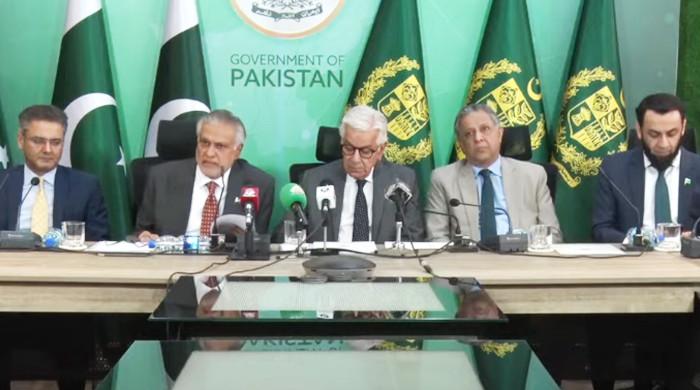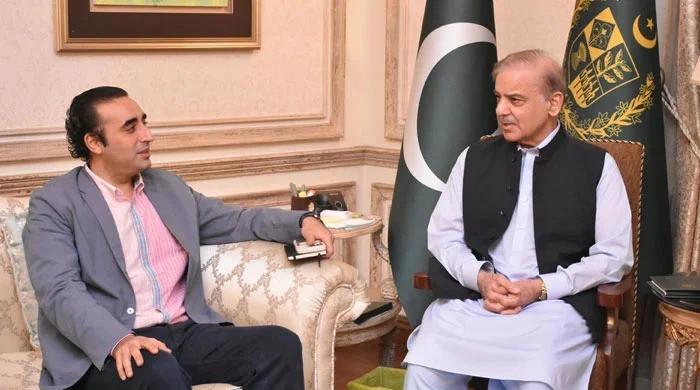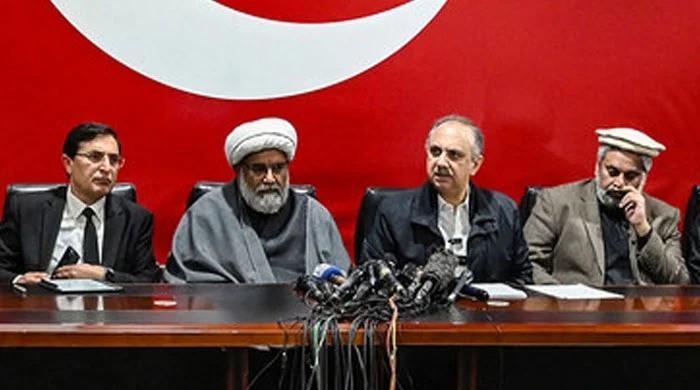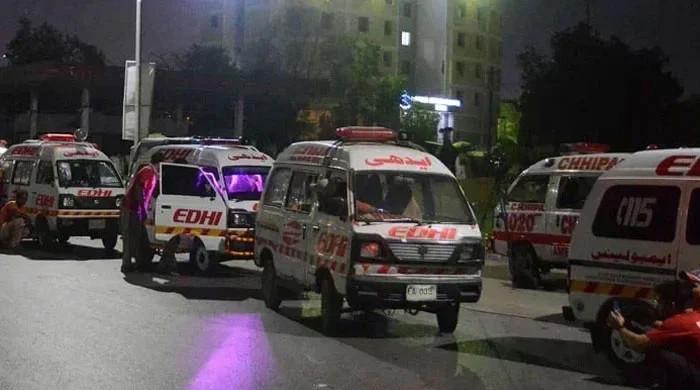Report acknowledges Pakistan’s efforts in terror fight
Pakistan continues to remain among top five countries affected by terrorism for the thirteen consecutive year
November 20, 2019
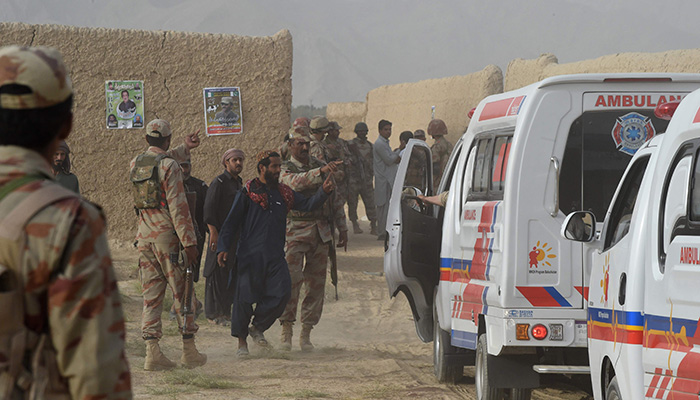
KARACHI/PARIS: The Global Terrorism Index (GTI) showed on Wednesday that the government’s effort to reduce terrorism, with the help of the National Action Plan and military operations in the tribal belt in the last few years, has started paying dividends as the country for the fifth consecutive year witnessed a reduction in terrorism related incidents in 2018.
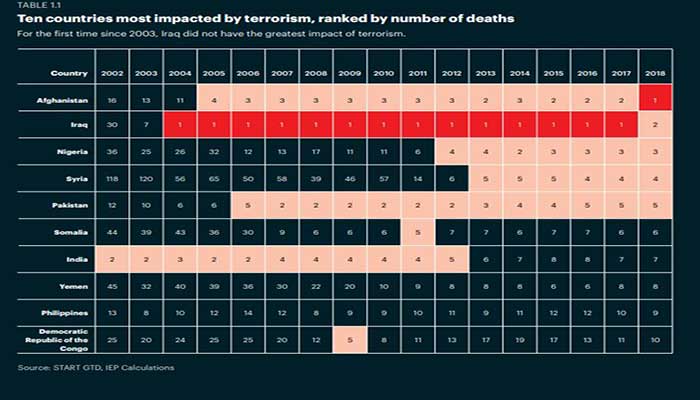
However, in the report Pakistan continued to remain among the top five countries affected by terrorism for the thirteen consecutive year. While the deadly attack on Siraj Raisani’s political gathering in July, 2018 marked as the third deadliest attack in the world in terms of fatalities.
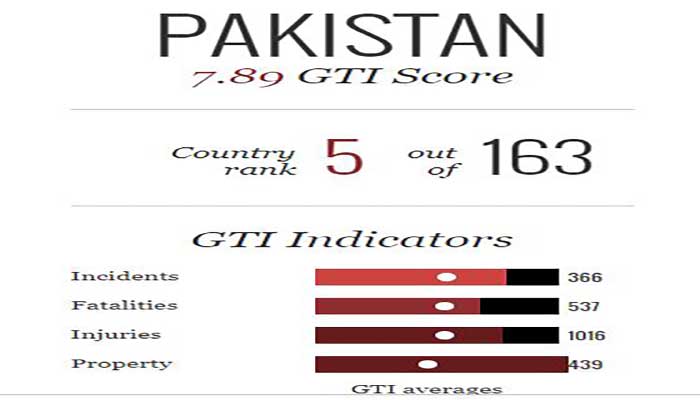
The terror index, issued by the Sydney based Institute for Economics and Peace, ranked Pakistan at 5 out of 165 countries with a score of 7.8 out of ten, witnessing a reduction of 0.292 from 2017. The report noted that 537 people were killed in 2018 in Pakistan, while 1,016 were injured, and 366 terrorist incidents were reported. Out of this, private citizens and property bore the brunt of the terror attacks. While, terror related deaths since 2001 now stands at 17,220.
Three per cent of global deaths due to terrorism in 2018 were in Pakistan. While Pakistan stood on number 5 for the largest decrease in deaths from terrorism with a reduction of 315.
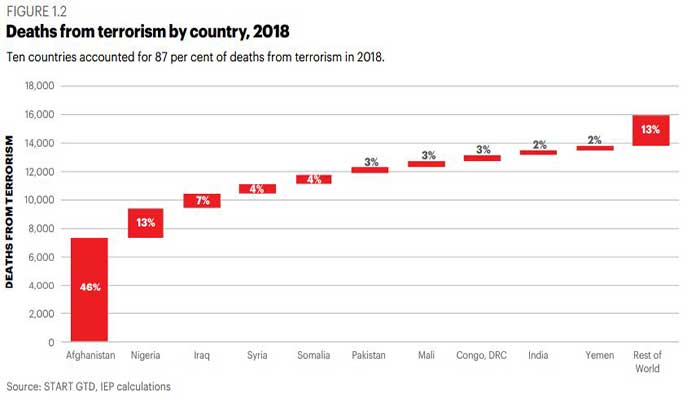
The report noted that Pakistan, along with Iraq and Syria, saw the most improvement on the index in 2018. It said, “The impact of terrorism fell for the fifth consecutive year in Pakistan in 2018, with the number falling 37 per cent to 537.”
Defence analyst Imtiaz Gul, while commenting on the report, says, “Pakistan needs to keep up the pace,” adding that a lot more needs to happen.
Whether the report would have an impact on the government’s efforts to bring tourists to the country, Gul said that the report is of no consequences. He added that it all depends on how the major powers view the decline of terrorism in the country.
The report observed that the number of incidents also decreased by 36 per cent to 266. It noted that the numbers for 2018 are considerably low compared to 2013 when the country’s death and incidents were at their peak.
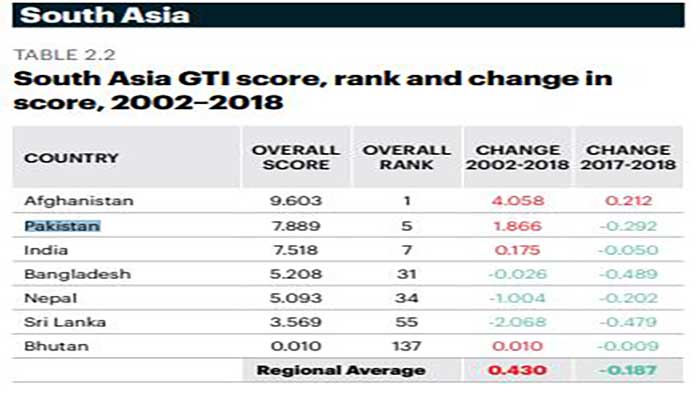
The GTI said, “In South Asia, Pakistan was the third country which saw the largest improvement. The first was Bangladesh while Sri Lanka was second in South Asia.”
Three attacks in Pakistan were mentioned in the 50 worst attacks in 2018. The attack on Siraj Raisani was the third deadliest, while a blast in November 2018 in a market place in Orakzai District was placed on number 38. The bombing outside a polling station on election day in June 2018 was reported as the 42nd deadliest attack of 2018. All the attacks were claimed by Daesh’s Khorasan chapter.
Daesh Khorasan deadliest group
The report stated that the Daesh Khorsan was the deadliest terrorist group in Pakistan in 2018, as it claimed 251 deaths which was 36 per cent of the total number of deaths. Most of the deaths that occurred in 2018 were in Balochistan.
The report observed that 2018 was the “deadliest year on record of Daesh’s Khoorsan chapter due to its growing presence in South Asia after it defeats in Iraq and Syria.”
The report said, “Since ISIL’s declaration of an Afghanistan/ Pakistan province in 2015, the Khorasan Chapter has substantially reinforced its organisational capacity in both countries, largely due to its ability to foster partnerships with regional militant groups.”
According to the index, 11 groups, including the TTP and LeJ, were found to have worked with Daesh Khorasan.
The Tehreek-e-Taliban Pakistan (TTP) took 151 lives and was the second deadliest terrorist group in the country.
The report also noted that the implementation of the National Action Plan and crackdowns against militants in the tribal areas was bearing fruits. It said that TTP related incidents dropped by 56 per cent in 2018. It noted that the trend of reduced terrorism reflects on the “continued decline of TTP’s activity” across the country, which has claimed more than 4,000 deaths since 2007.
However, the report noted a reduction in the terrorist activity of the banned Lashkar-e-Jhangvi, which was also the third major terrorist group and carried out only two attacks which killed six people.
Impacts in provinces
Khyber-Pakhtunkhwa and Balochistan were reported as the most impacted region of the country in terms of attacks and deaths. The GTI said, “Collectively, the two accounted for 77 per cent of attacks and 84 per cent of deaths.”
The report said that the attack on Balochistan Awami Party’s Siraj Raisani’s political rally was the deadlist attack of 2018 and also the second deadliest attack since 1970.
Despite lauding Pakistan’s efforts in reducing terror related incidents the report noted “terrorism still remains a major threat in the country.” It said, “links among terrorist groups are especially prevalent across conflict-prone borders, like those separating Pakistan from India and Afghanistan.”
Economic impact of Terrorism
The GTI showed that the global economic impact of terrorism in 2018 amounted to US$33 billion, a decline of 38 per cent from its 2017 level. This is the fourth consecutive year that the economic impact of terrorism has declined from the peak of $111 billion in 2014.
The report noted that since 2014 the economic impact of terrorism declined by 90 per cent Pakistan.
Global Outlook
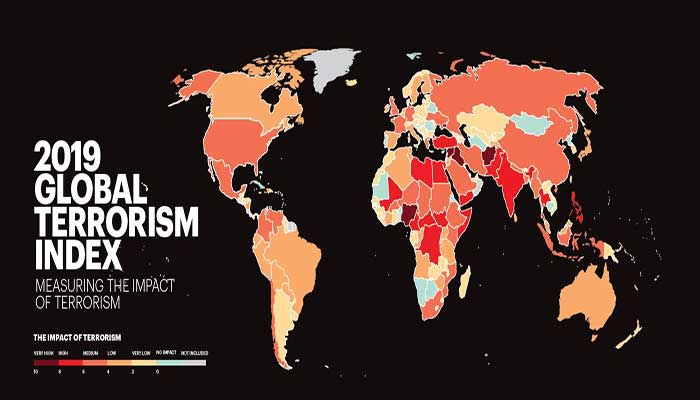
The number of global deaths from terrorism fell 15.2 per cent in 2018, even as the number of countries affected by extremist violence continued to grow, the 2019 GTI showed.
From a high of 33,555 deaths in 2014, when the Daesh lured tens of thousands of militants to the Middle East, the number of terrorism deaths has more than halved to 15,952 in 2018, the index showed.
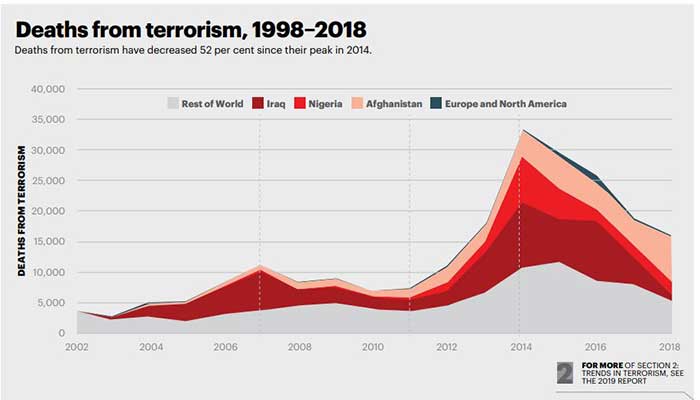
The largest declines in 2018 were recorded in Iraq, which proclaimed a military victory over IS the previous year, and Somalia, where US forces have been conducting airstrikes against Shabaab extremists since 2017.
For the first time since 2003, Iraq was not the country worst-hit by terrorism, according to the index which defines terrorism as "the threatened or actual use of illegal force and violence by a non-state actor to attain a political, economic, religious, or social goal through fear, coercion, or intimidation".
Afghanistan, where the Taliban succeeded Daesh as the world´s deadliest terror group, topped the table with 1,443 attacks killing 7,379 people, ahead of Iraq with 1,131 attacks that left 1,054 dead and Nigeria, with 562 attacks that killed 2,040 people.
Syria, which counted 131 incidents that claimed 662 lives, ranked fourth.
With additional input from AFP





